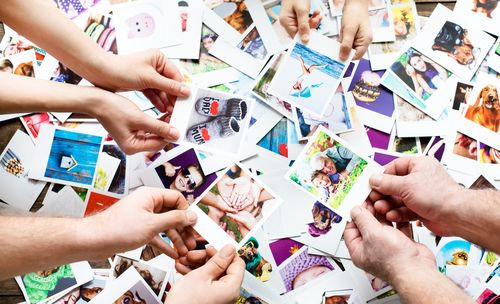Is Life Past Age 25 Just A Wasteland? We Form Our Most Important Memories While Young

What exactly is memory? Some people believe it is time-travel, the internal machine that allows us to move back and forth across space and history. Other people believe it is identity, with our recollection of past experiences shaping who we are in the here and now. Others believe it is our fortune, a gift-wrapped present of cognition awaiting an hour of solitude to be opened and explored. A team of researchers from the University of New Hampshire discovered that by the time most people reach the age of 25, they have already formed the most important memories of their lives. Working with older adults, the researchers discovered people generally highlighted life transitions, such as marriage and having children, when telling the story of their lives and these events occurred when they were still young. “Why don't adults report more memories from the ages of 30 to 70?” asked Kristina Steiner, a doctoral student in psychology at UNH and the study’s lead researcher. “What is it about the ages of 15 to 30 that make them so much more memorable?"
A Cluster of Events
A reminiscence bump is a term psychologists use for the tendency of older adults to have increased recollection of events occurring between the ages of 15 and 30. In fact, past studies have made this claim again and again so the team of UNH psychologists decided to design an experiment to investigate the bump for themselves. For their new study, they collected life stories from 34 members of a retirement community. Participants, who were white, between the ages 59 to 92, and primarily educated (76 percent had earned at least an undergraduate degree), were instructed to narrate their life in a free-flowing, natural manner within 30 minutes. One week later, participants were asked to divide their stories into self-defined “chapters.”
Sure enough, the researchers discovered a pronounced reminiscence bump, in this case between the ages of 17 and 24, during which period the participants began or ended most of the chapters of their life story. "Our life narratives are our identity,” Steiner said. “By looking at life narratives, researchers can predict levels of well-being and psychological adjustment in adults. Clinical therapists can use life narrative therapy to help people work through issues and problems in their lives by helping them see patterns and themes.” Further, Steiner and her colleagues believe predictable personal episodes, such as marriage and beginning a family, that occur near the boundaries of an extended period “receive preferential processing to enhance long-term memory.” Clearly, the results of this study also imply valence — the positive or negative emotion surrounding a memory — may determine which experiences we forget and which we retain. Another researcher, though, decided to ask the question in reverse: How might the process of memory itself color an experience?
The Direction We Travel Makes a Difference
Some memories are close to us, while others are far. People often refer to distance when talking about the past, yet this quality seems to be influenced by factors other than actual time. Noting that people often remember events as part of a stream of related events, Kent C.H. Lam, Department of Psychology, Wilfrid Laurier University, wanted to understand whether the distance we feel is affected by the time-direction in which we recall events in our lives.
If you remember, say, your birthday party from five years ago by working your way back to it from the present, would you feel differently than if you remember the party as the first of many events leading up to now?
To understand how the order of memories affects the emotional distance we feel, Lam constructed a study of five separate experiments in which students recalled the day they were accepted into college. In the first study, two groups of students were asked to remember the event within a cluster of other events, but the first group remembered the moment within a stream moving backwards in time, while the second group remembered it moving forward in times. Those moving backward felt closer to the day than those moving forward. In another study, Lam showed how participants remembering backward felt less change had occurred to them since the event and for this reason, felt closer to it than those remembering in a forward manner. And, in a final study, he verified that those remembering backward had the impression that relatively little had changed in their lives, and for this reason the event felt closer.
“The present research suggests that how one chooses to travel through time — and in particular the direction of the trip — can have important psychological consequences,” wrote Lam in a published paper. “People come to feel closer to a target event when they recall a stream of related events in a backward direction (i.e., a reverse chronological order ending with the target event) rather than a forward direction (i.e., a chronological order beginning with the target event).” Ultimately he believes his findings "contribute to an emerging literature emphasizing that how individuals remember a past event may be as consequential as what they remember.”
Sources:
Lam KCH. Trips Down Memory Lane: Recall Direction Affects the Subjective Distance of Past Events. Personality and Social Psychology Bulletin. 2009.
Steiner KL, Pillemer DB, Thomsen DK, Minigan AP. The reminiscence bump in older adults' life story transitions. Memory. 2013.
Published by Medicaldaily.com



























